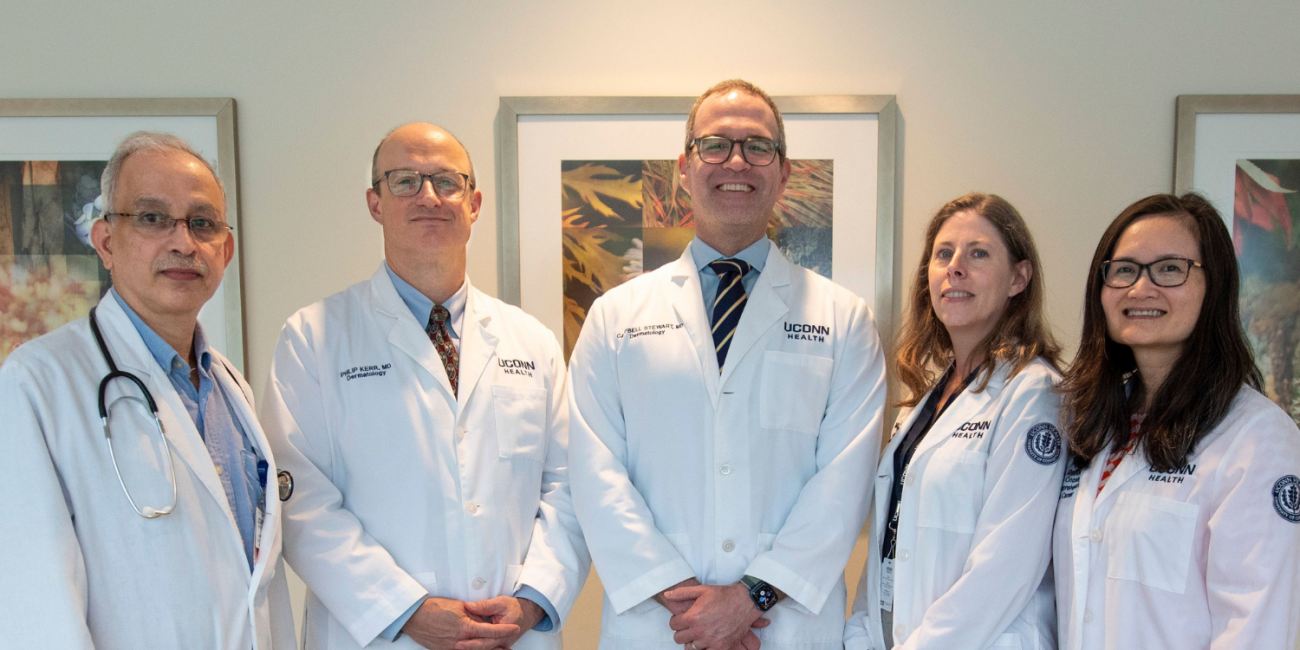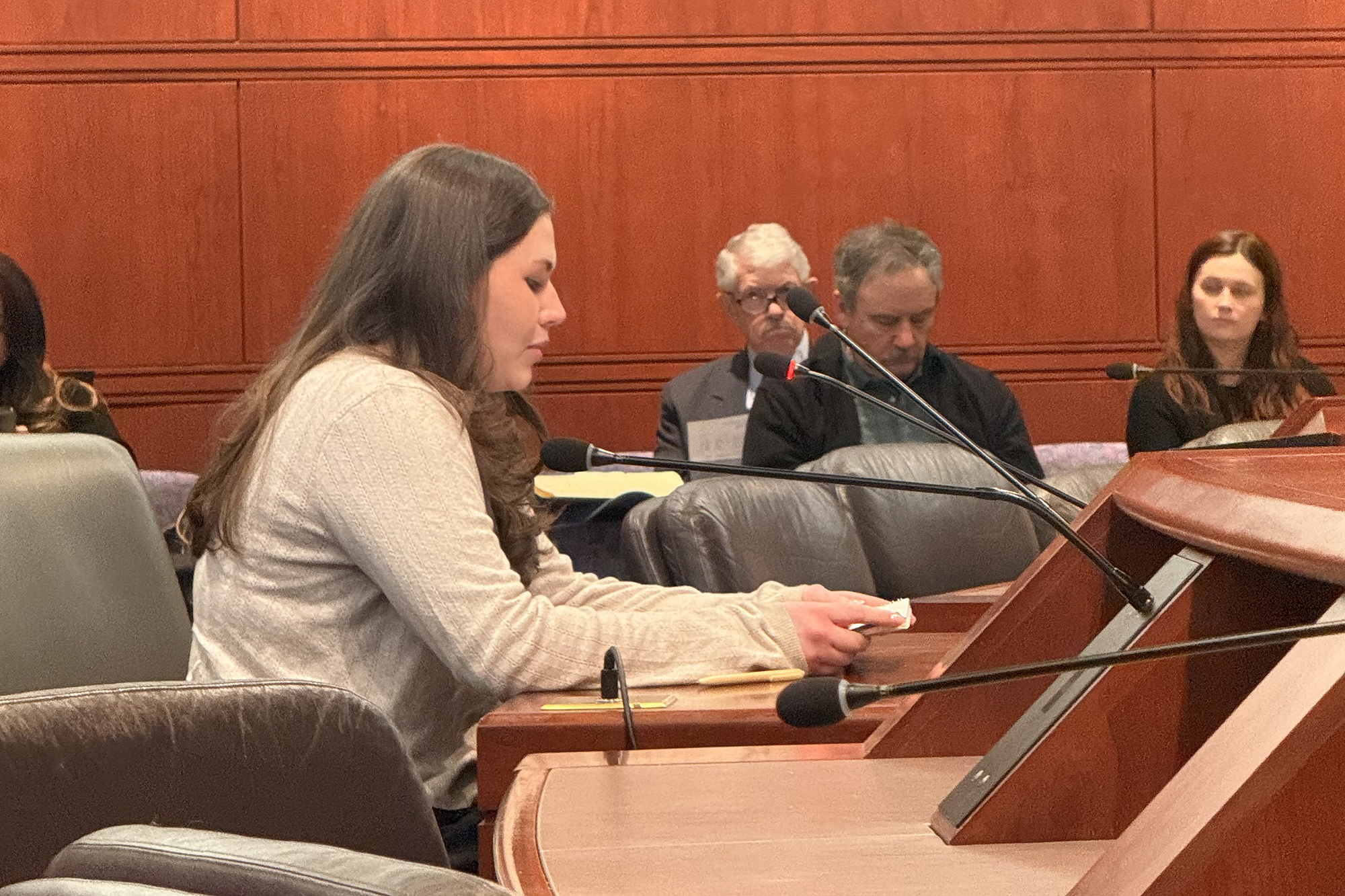When patients have a concern about melanoma, a form of skin cancer, they may turn to their dermatologist for care. Fortunately, for most patients, melanoma is detected early and may be treated with simple excision and dermatologic follow-up.
For a small number of patients with more advanced melanoma, there is an increased risk of their disease spreading into lymph nodes or other sites in the body. For these patients, specialized expertise from a surgical oncologist and a medical oncologist can provide treatments that offer better outcomes, including a better chance of a cure.
The Carole and Ray Neag Comprehensive Cancer Center in collaboration with the Dermatology Department now offers specialized melanoma care at UConn Health and the UConn School of Medicine. With the arrival of medical oncologist, Dr. Margaret Callahan, chief of the Division of Hematology and Oncology, and surgical oncologist Dr. Giao Phan, professor of surgery, joining expert medical oncologist Dr. Upendra Hegde and a well-established dermatology and dermatopathology team led by Dr. Philip Kerr and Dr. Campbell Stewart, these melanoma and skin cancer experts provide specialized expertise and comprehensive care in treating melanoma at any stage, including advanced disease. This team meets on a weekly basis to discuss new patients and review care plans in a multi-disciplinary fashion.
Phan, a graduate of Johns Hopkins University School of Medicine, completed surgical oncology fellowships and research at the National Cancer Institute/National Institutes of Health and at the Moffitt Cancer Center. As a surgical oncologist specializing in melanoma and skin/soft tissue cancers, Phan’s expertise plays a crucial role in the comprehensive care of patients with these conditions. She is an expert in the spectrum of surgical tools for treating advanced melanoma, including lymph node mapping and intralesional treatments (such as the FDA-approved therapy Imlygic/T-VEC), providing a multidimensional approach to patient care. In addition to her surgical expertise, she has extensive experience with clinical research in immunotherapies, including adoptive T cell therapy and radiographic surveillance of melanoma.
Callahan, a medical oncologist, is a graduate of UConn and the UConn School of Medicine, where she received her MD and Ph.D. She completed her oncology fellowship and served as faculty at Memorial Sloan Kettering before joining UConn as the chief of the division of hematology and oncology. With over a decade of experience focused on treating patients with advanced melanoma and leading clinical trials of novel immunotherapies, she brings a wealth of specialized melanoma knowledge and clinical insight to her practice. She also leads a translational research team focused improving the immunotherapy treatment options for patients.
UConn’s expanded team of melanoma and skin cancer experts and researchers creates a hub for melanoma expertise and patient-focused research in Connecticut. This initiative offers a modern multidisciplinary approach to diagnosing, researching, and treating melanoma, a particularly aggressive form of skin cancer, while teaching the next generation of cancer specialists.
“Having a team of specialized melanoma specialists within one organization allows for a comprehensive approach to the treatment and management of melanoma, with all team members working collaboratively,” says Phan. “This collaboration leads to more effective and personalized care for patients dealing with melanoma, as they can benefit from the expertise of all specialists. The team of experts reflects a commitment by UConn Health to providing state-of-the-art care for patients with melanoma.”
“I’m delighted to be returning to my alma mater, UConn,” says Callahan. “Working together with Drs. Phan and Hegde and bringing some of my experience in advanced melanoma and in clinical trials to the team, I hope will be a great way to give back. I’m also looking forward to being part of the vibrant academic community and helping to train the next generation of clinicians and clinician scientists. UConn has an excellent immunology department, led by Dr. Anthony Vella, and they have had a longstanding commitment to immunotherapy research.”
Phan, Callahan, and Hegde treat a wide spectrum of melanoma and skin cancer patients, starting with patients who could be cured with surgery alone to those with more advanced disease who might need multimodality therapy, such as patients whose disease has spread to lymph nodes or distant organs like the lung, liver, or brain. Surgical interventions, such as lymph node removal, aim to address localized spread, while systemic therapies play a crucial role in targeting cancer cells throughout the body. Immunotherapy and targeted inhibitors have improved outcomes for patients with advanced melanoma, often providing effective treatment options that often control the disease.
Additionally, Callahan and Phan are excited about continuing their passion and expertise in immunotherapy research and working to bring innovative therapies and new clinical trials to UConn Health patients. They look forward to working with medical students, fellows and research collaborators and highlight the strength of the immunology department and the opportunities for translational research in the future.
For referrals call the melanoma navigator at 860-692-8455.



